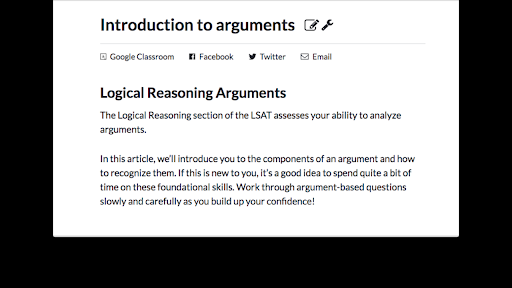What Are the Three Components of a Logical Argument
Reasons answers and evidence B. A valid argument is one where the conclusion follows from the truth of the premises.

Logical Arguments English Composition 1
There are three stages to creating a logical argument.

. We have Aristotle to thank for identifying the syllogism and making the study of logic much easier. When you discuss the opposition in your argument it allows you to refute other claims establishing that your argument is well-founded and credible. The focus on syllogisms dominated the field of philosophy for thousands of years.
Explain how and where you actually agree with some opposing views. What does the persuader want the hearer to think or do. P 1 p 2 p n q.
Practical logic is based on three components. Add your answer and earn points. Answered What are the three components of a logical argument.
Arguments contain those components because those are the ones that workused together they stand the best chance of persuading others that you are correct. What are the three components of a logical argument. A logical argument is to quote the Monty Python sketch a connected series of statements to establish a definite proposition.
You have to be careful and clear that you are not conveying to a reader that you are rejecting your own claim. Inferences are the reasoning part of an argument. The three components of a logical argument consist of reasons evidence and what else.
Lecture notes from the first five class sessions are here covering a number of different topics on writing. Premises inference and conclusion. Components of a logical core of an argument.
1 reasons 2 evidence and 3 conclusions. There are two traditional types of argument deductive and inductive. Premise inference and conclusion.
Note that Perls argument has a good structure so if the conclusion is false one of the premisses has to be false III. An argument is a connected series of statements that create a logical clear and defined statement. Lecture 1 - Class Outline Lecture 1a - The Writing Process Lecture 2 - Three Elements of an Argument Lecture 3 - Research.
Premise inference and conclusion. Answer should be D. Two essential critical thinking skills are the ability to 1 construct a logical argument and 2 _____.
Asked Feb 19 2019 in Education by MontREALady A. A syllogism need not have only three components to its argument but it must have at least three. Premises are statements that a person presents as a fact.
Problems answers and conclusions student-success No related questions found. Some literature also state that the three parts of an argument are. Have your literature essay or book review written without having the hassle of reading the.
Problems evidence and answers C. If the premises are true the conclusion must also be true. The claim or thesis tells people what you consider a true way of describing a thing situation relationship or phenomenon or what.
Essential components of a logical argument include the conclusion and the premise s. Answer 1 mstacy8 Answer. Reasons answers which questions.
A validargument is defined as one where if the premises are true then the conclusion is true. Ask probing questions C. The argument structure is the sum and substance of logic.
Outline the opposing position. 1 reasons 2 evidence and 3 conclusions. This form of deductive reasoning is called a syllogism.
Tracking Sources Literature Reviews Lecture 4 - Writing for Grants Lecture 5 - Writing Press Releases. Why should the hearer think or do something. An argument is a sequence of statements premises that ends with a conclusion.
London is considered rainy. Problems answers and conclusions b. Claim grounds and warrant.
Is there support for this. Reasons answers and evidence d. The three components of a logical argument consist of reasons evidence and what else.
The Three Primary Elements of an Argument Claim assertion proposition A statement affirming or denying something the answer to the question What are you trying to prove Whats your point - Can be denied in this context Grounds Support evidence material which will convince audienceopponent. 32K views View upvotes R. The conclusion is the final inference and is constructed from the premise and inferences.
A claim is your conclusion grounds are supporting evidence and a warrant shows how the evidence maps to the claim. Reasons evidence and conclusions D. Tokyo gets 1530 millimeters of rain a year.
There are three essential components sometimes referred to as stages to an argument. The evidence you supply should come from reputable sources and appeal to your audiences emotions ethics and logic. A deductive argument is either valid or invalid.
There are three components in a logical argument. A deductive argument provides conclusive proof of its conclusions. The conclusion is the claim being supported while the premises are the claims that support the conclusion.
Students barely have time to read. The premise defines the evidence or the reasons that exist for proving your statement. It is important to indicate that you are merely open to considering alternative.
The reason is that Consider the following statement. For the sequence of premises p 1 p 2 p n and conclusion q an argument is valid if. Reasons evidence and conclusions Advertisement jordandickersoor3h5k is waiting for your help.
Acknowledge weaknesses or holes in your own argument. How do you know. Problems evidence and answers c.
All that remain in this course is to sketch out a bit of what this means. There are three components in logical argument. Make excuses that justify being lazy B.
For instance the question gets things started off.

Steps To Write An Argumentative Essay Argumentative Essay Essay Writing Skills Argumentative Essay Topics

How To Write An Argumentative Essay Argumentative Essay Argumentative Essay Topics Essay Topics

Critical Thinking And Reasoning Logic And The Role Of Arguments Public Speaking
Comments
Post a Comment